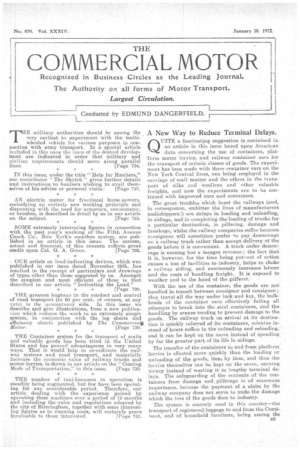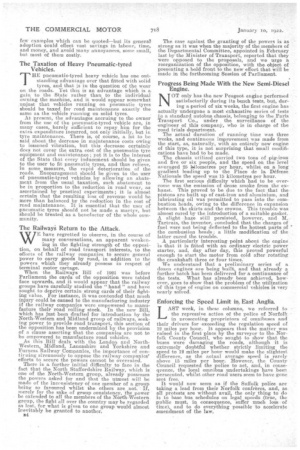A New Way to Reduce Terminal Delays.
Page 1

Page 2

If you've noticed an error in this article please click here to report it so we can fix it.
QITITE a fascinating suggestion is contained in an article in this issue based upon American data concerning the use of containers, platform motor lorries, and railway container cars for the transport of certain classes of goads. The experiment has been made with three container cars on the New York Central lines, one being employed in the carriage of mail matter and the others in the transport of silks and woollens and other valuable freights, and now the experiments are to be continued with improved cars and containers.
The great troubles which beset the railways (and, in consequence, embitter the lives of manufacturers andishippers* are delays in loading and unloading, in sidings, and in completing the loading of trucks for a particular destination, in pilfering, damage and breakage, whilst the railway companies suffer because consignees will sometimes prefer to pay demurrage on it railway truck rather than accept delivery of the goods before it is convenient. A truck under demurrage is earning but. a meagre revenue ; the fact that it is, however, for the time being putout of action causes a loss of facilities to industry, helps to choke a railway siding, and enormously increases labour. and the costs of handling freight. It is exposed to weather and to the hand of the pilferer. .
With the use of the container, the goods are not handled in transit between consignor and consignee; . they travel all the way under lock and key, the bulkheads of the container cars effectively foiling all. attempts to break into the steel containers, and the, handling by cranes tending to prevent damage to the goods. The railway truck on arrival at its destination is quickly relieved of its containers, minutes instead of hours suffice in the unloading and reloading, and it can be kept on the move instead of spending by far the greater part of its life in sidings.
The transfer of the containers to and from platform lorries is effected more quickly than the loading or unloading of the goods, item by item, and thus the loi'ries themselves can be kept on the move, earning money instead of wasting it in lengthy terminal delays. The safeguarding of the contents of the containers from damage and, pilferage is of enormous importance. because the payment of a claim by the railway company does not serve to undo the damage which the ]oss" of the goods 'does to industry.
The system is scarcely used in this country—the transport of registered luggage to and from the Continent, and of household furniture, being among the few examples which can be quoted—but its general adoption could effect vast savings in labour, time, and money, and avoid many annoyances, some small, but most of them costly.
The Taxation of Heavy Pneumatic-tyred Vehicles.
THE pneumatic-tyred heavy vehicle has one outstanding advantage over that fitted with solid tyres, and that is in the question of the wear on the roads. Yet this is an advantage which is a gain to the State rather than to the individual owning the machine, and it would appear somewhat unjust that vehicles running on pneumatic eyres should be taxed for road maintenance exactly the
same as the vehicle running on solid tyres. . At present, the advantages accruing to the owner from the use of the pneumatic-tyred vehicle are, in many cases, barely sufficient to repay him for the extra expenditure incurred, not only initially, but in tyre maintenance. There is, of course, a lot to be said about the decrease in maintenance costs owing to lessened vibration, but this decrease certainly does not cover the extra cost of the pneumatic tyre equipment and maintenance ; yet it is to the interest of the State that every inducenient should be given to the user to fit pneumatic tyres, and thus relieve, in some measure, the rapid deterioration of the roads. Encouragement should be given to the user of pneumatic-tyred vehicles by allowing an abatement from the usual taxation, such abatement to be in proportion to the reduction in road wear, as ascertained by practical experiments ; it is almost certain that the resulting less of revenue would be more than balanced by the reduction in the cost of road maintenance. It is essential that the user of pneumatic tyres should not be made a martyr, but should be treated as a benefactor of the whole community.
The Railways Return to the Attack.
WE have regretted to observe, in the course of many conversations, an apparent weakening in the fighting strength of the opposition, on behalf of road transport interests, to the efforts of the railway companies to secure general power to carry goods by road, in addition to the powers which they telready possess in respect of terminal motor cartage.
When the Railways Bill of 192t was before Parliament the cards of the opposition were tabled face upwards, and it would appear that the railway groups have carefully studied the " hand " and have sought to deprive certain strong cards of their fighting value. For instance, it was contended that much injury could be caused to the manufacturing industry if the railway companies were empowered to manufacture their road rolling stock. In the new Bill, which has just been drafted for introduction by the North-Western and Midland group of railways, seeking power to provide road transport, this section of the opposition has been undermined by the provision of 8 clause asserting that the companies are not to be empowered to manufacture road. vehicles.
As this Billdeals with the London and NorthWestern, Midland, Lancashire and Yorkshire and Furness Railway Companies, the importance of cent:truing strenuously to oppose the railway companies' efforts to secure the powers cannot be overrated. There is a further initial difficulty to face in the fact that the North Staffordshire Railway, which is one of the North-Western group, already possesses the powers asked for and that the utmost -will be made of the ineensistency of one member of a group being so favoured whilst the others are not. If, merely for the sake of group consistency, the power be extended to all the members of the North-Western group, the fight all over the country may be regarded as lost, for what is given to one group would almost irevitably be granted to another.
B4
The case against the granting of the powers is as strong as it was when the majority of the members of the Departmental Committee, appointed in February last by the Minister of Transport, reported that they were opposed to the proposals, and we urge a reorganization of the opposition, with the object of presenting a bold front to the new effort that will be Made in the forthcoming Session of Parliament.
Progress Being Made With the New Semi-Diesel Engine. .
NOT only has the new Peugeot engine performed satisfactorily during its beech tests, but, during a period of six weeks, the first engine has actually undergone a most exhaustive series of tests in astandard autobus chassis, belonging to the Paris Transport Co., under . the surveillance of the engineer of this company, who is in charge of the road trials department.
The actual duration of running time was three weeks, and continuous improvement was made from the start, as, naturally, with an entirely new engine of this type, it is not surprising that small modifications have had to be made.
The chassis utilized carried two tons of pig-iron and five or six people, and the speed on the level averaged 25 kilometres per hour, whilst on a long gradient leading up to the Place de in Defense Nationale the speed was 15 kilometres per hour.
The first serious difficulty which hadto be overcome was the emission of dense smoke from the exhaust. This proved to be due to the fact that the. pistons are built up of east-iron and aluminium, and lubricating oil was permitted to pass into the combustion heads, owing to the difference in expansion between the skirts and the crowns. This trouble was almost cured by the introduction of a suitable gasket. A slight -haze still persisted, however, and M. Tartrais, the inventor, concluded that the charges of fuel were not being deflected to the hottest parts of the combustion heads ; a little modification of the latter cured the trouble.
. A particularly interesting point about the engine is that it is fitted with an ordinary electric power starter, and, day after day, this proved powerful enough to start the motor from cold after. rotating the crankshaft three or four times..
We understand that a preliminary series of a desen engines are being built, and that already a further batch has been delivered for a continuance of the tests. What has already been achieved, however, goes to show that the problem of the utilization of this type of engine on commercial vehicles is very nearly solved.
Enforcing the Speed Limit in, East Anglia. LAST week, in these columns, we referred to the repressive action of the police of Norfolk in prosecuting proprietors of omnibuses and their drivers for exceeding the regulation speed of 12 miles per hour. It appears that the matter was raised in the first place by the surveyor to the Norfolk County Council, who sought to show that the buses were damaging the roads, although it is extremely doubtful whether strictly limiting the speed to 12 miles per hour would make the slightest difference, as the actual average speed is rarely above 15 miles per hour. However, the County Council requested the police to act, and, in consequence, the local omnibus undertakings have been persecuted, whilst other road users seem to have gone scot free.
It would now seem as if the Suffolk police are taking a lead from their Norfolk confreres, and, as all protests are without avail, the only thing to do is to base bus schedules on legal speeds (true, the
i
public must, n consequence, suffer much loss of time), and to do everything possible to accelerate amendment of the law.


































